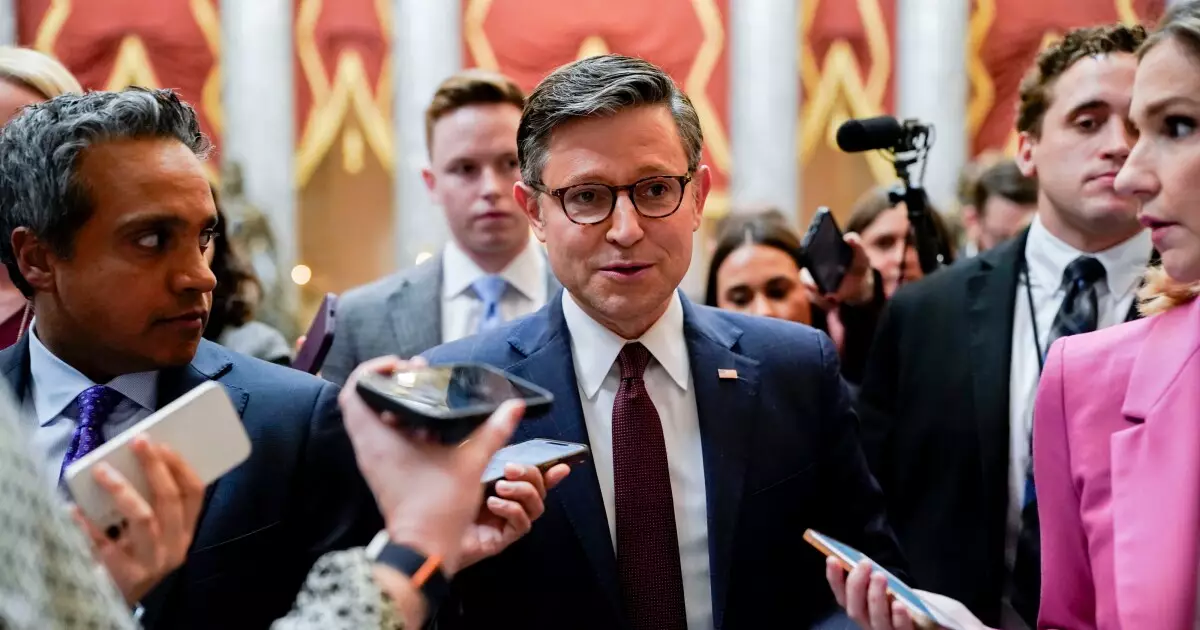Late on a Tuesday evening, the U.S. House of Representatives upheld a budget resolution that holds the potential to significantly alter the economic landscape through a substantial tax reform package. The tight vote, which culminated at 217-215, serves as a testament to the fragile cohesion of the Republican majority in Congress. House Speaker Mike Johnson, hailing from Louisiana, expressed his satisfaction with the outcome, framing the resolution as a pivotal step in actualizing the broader “America First” agenda championed by former President Donald Trump. The narrow margin not only emphasizes the challenges inherent in mobilizing party support but also highlights the stakes involved in driving consequential legislative change in a politically charged environment.
At the heart of this proposed budget framework lies the staggering goal of $4.5 trillion in tax reductions, largely built upon the foundations established by the 2017 Tax Cuts and Jobs Act (TCJA)—a hallmark piece of legislation from Trump’s first term as President. This framework proposes a strategic reduction of $2 trillion, with the potential of Medicaid cuts emerging as a focal point. Additionally, the plan involves a significant escalation of the national debt ceiling by $4 trillion, an aspect that raises important questions regarding fiscal responsibility and long-term economic sustainability.
The urgency exhibited by House Republicans—as articulated by Speaker Johnson—underlines a commitment to executing bold reforms that cater to their base while aiming to deflect scrutiny regarding potential oversights related to fiscal management. However, the ramifications of such sweeping changes require careful consideration, particularly in terms of their impact on the municipal bond market, which is keeping a vigilant watch on how these modifications may affect the existing tax exemption on municipal bond interest.
The fallout from proposed tax reforms has stirred anxieties within the municipal bond market. Moving to curtail or remove the tax exemption on municipal bond interest could precipitate far-reaching consequences for local governments that rely on these instruments for financing projects. The Congressional Budget Office has identified a hefty $4.7 trillion as the projected cost of extending the TCJA, positioning policymakers in a dilemma as they seek viable revenue sources to offset this financial commitment.
A particular concern for lawmakers is the longstanding debate surrounding the cap imposed on state and local tax (SALT) deductions—an issue that resonates deeply with constituents from high-tax states such as New York and California. These states argue that the cap constrains their financial flexibility, prompting calls for relief among local representatives. Rep. Mike Lawler from New York has been vocally advocating for the lifting of this cap, framing it as an essential priority that must be addressed within the current legislative framework.
The road ahead for the House and Senate now involves the crucial process of negotiating a unified budget resolution. While Senate Republicans have endorsed their own $340 billion budget resolution lacking tax reform components, they express a desire to render the TCJA extensions permanent. However, this ambition is met with concern from House leaders, who perceive the Senate’s proposed cuts as “a nonstarter.”
To achieve success, GOP leaders will need to ensure adequate support for the final reconciliation tax package, a process requiring deft negotiation and consensus-building across party lines. Furthermore, Congress faces the pressing task of averting a government shutdown as the March 14 deadline looms closer. As both chambers convene to discuss the next steps, collaboration remains essential.
As discussions unfold regarding tax policy, including meetings between key congressional figures and administration officials, the prevailing sentiment among Republican leaders suggests an eagerness to uphold the principles set forth in the budget resolution. However, the complexity of the issues at hand underscores the intricate balance of political maneuvering, economic priorities, and stakeholder interests that will shape U.S. tax policy in the months to come. The stakes for both the fiscal landscape and the everyday lives of Americans remain incredibly high, drawing attention from analysts, politicians, and everyday citizens alike. As this legislative saga continues, it is imperative to consider the broader implications of these proposed reforms for governance, economic stability, and public trust in governmental institutions.

